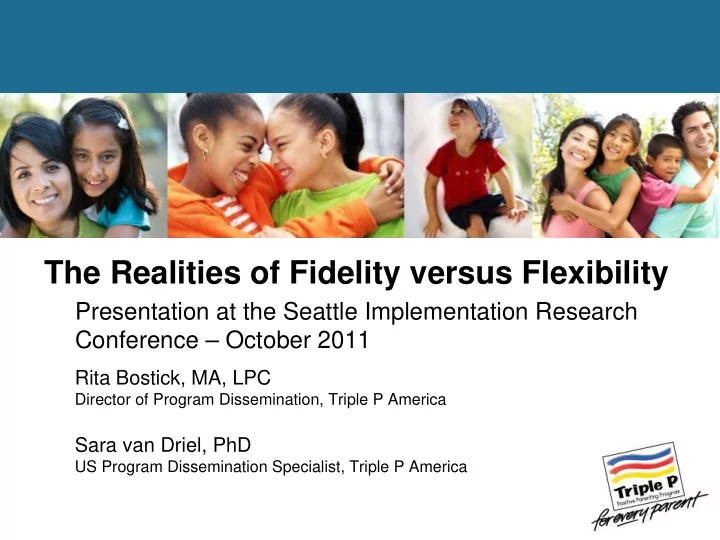

The Realities of Fidelity versus Flexibility Presentation at the Seattle Implementation Research Conference – October 2011 Rita Bostick, MA, LPC Director of Program Dissemination, Triple P America Sara van Driel, PhD US Program Dissemination Specialist, Triple P America
Overview • Introduction to fidelity vs. flexibility • Very brief overview of Triple P – Positive Parenting Program • Guidelines for fidelity vs. flexibility – Examples of low-risk and high-risk adaptations • Implications • Current research and future directions
Defining Fidelity and Flexibility • Fidelity - staying true to the evidence-base – What cannot vary • Flexibility - tailoring to fit the needs of individual families, providers, agencies, communities, etc. – What can vary
Why discuss fidelity vs. flexibility? • Fidelity is necessary to increase chances for achieving the same results found in the research trials. • Individual families do not fit into a particular box (or scripted manual). • Parents cannot benefit from interventions they do not experience. (Fixen and Blasé, 2010). • Rigid adherence to a manualized treatment program may not be necessary and may not lead to optimal delivery (e.g., not achieving therapeutic change). (Mazuchelli & Sanders, 2010; Kendall et al., 1998; Weisz et al., 1995)
Another consideration … • This question of fidelity and flexibility spans multiple layers of effective dissemination of evidence-based practice, including : – Program delivery (provider to client) – Provider training – Dissemination targets
What is Triple P? • Multi-level parenting and family support strategy • Prevention / early intervention / population health approach • Evidence based • Use of self-regulation framework • Multidisciplinary focus and delivered within a public health framework
Five Levels of Triple P Intervention 5. Enhanced/Pathways Triple P Behavioral family intervention Intensity of Intervention 4. Standard/Group/Self-Directed Triple P Broad focus parenting skills training 3. Primary Care Triple P Narrow focus parenting skills training 2. Selected Triple P General information/advice about parenting 1. Universal Triple P Media-based parenting information campaign
Self-Regulatory Framework Intervention Minimally Sufficient Self regulation Parental
Guidelines for Fidelity vs. Flexibility • Program fidelity (what not to vary) – Content and order (e.g. No adaptations, picking out strategies, adding new strategies etc). • Program flexibility (what can vary) – Process (e.g. length of program, duration of sessions, mode of delivery etc).
Mazzucchelli & Sanders (2010 ) Process variations
Mazzucchelli & Sanders (2010 ) Content variations
Fidelity and Flexibility in Training and Dissemination • Provider Training – Who is eligible for training? – Fidelity vs. flexibility in the training process? • Dissemination Targets – What organizations/agencies are targeted? – What do communities need in place to be effectiveness with evidence-based practice?
Implications: Implementation Support • Use of a multiple level model of implementation support, much like the multi-level model of interventions for families • Current implementation support offered by Triple P America: – Pre-planning • Telephone consultations • Site visits • Management Briefings – Pre-accreditation day for practitioners – Clinical implementation and support days for practitioners approximately 6 months post-training – Consultation calls with cohorts of 5 practitioners
Current Research and Future Directions • System trials of Triple P demonstrate positive population outcomes in community settings without strict fidelity monitoring. (Prinz et al., 2009; Sanders et al., 2005) • However, experience tells us that there is more to learn about how to best support an appropriate balance of flexibility vs. fidelity . – Implementation support for providers and/or organizations (pre and post training) – Training process • One trial currently in development to examine a peer-assisted, self-regulation model of supervision
References • Fixen, D. & Blasé, K. (2010) as cited in Van Dyke, M.K. & Naoom, F. Setting the stage: Active Implementation Framework to Integrate the Science and Practice of Implementation. Global Implementation Pre-Conference (August 14, 2011). • Kendall, P. C., Chu, B., Gifford, A., Hayes, C., & Nauta, M. (1998). Breathing life into a manual: Flexibility and creativity with manual-based treatments. Cognitive and Behavioral Practice, 5, 177–198. • Mazuchelli, T.G., & Sanders, M.R. (2010). Facilitating Practitioner Flexibility Within an Empirically Supported Intervention: Lessons From a System of Parenting Support. Clinical Psychology: Science and Practice, 17 , 238–252. • Prinz, R.J., Sanders, M. R., Shapiro, C. J., Whitaker, D. J., and Lutzker, J. R. (2009). Population-based prevention of child maltreatment: The US Triple P system population trial. Prevention Science, 10, 1-12 . • Sanders, M. R., Ralph, A., Thompson, R., Sofronoff, K., Gardiner, P. Bidwell, K. et al. (2005). Every family: A public health approach to promoting children’s well-being. The University of Queensland: Brisbane, Australia. • Weisz, J. R., Donenberg, G. R., Han, S. S., & Weiss, B. (1995). Bridging the gap between lab and clinic in child and adolescent psychotherapy. Journal of Consulting and Clinical Psychology, 63, 688–701.
Rita Bostick, MA, LPC Director of Program Dissemination, Triple P America rita@triplep.net | (803) 719-0055 Sara van Driel, PhD US Program Dissemination Specialist, Triple P America sara@triplep.net | (803) 719-1110 Head Office Address: 1201 Lincoln Street, Suite 201, Columbia, South Carolina 29201 Postal Address: PO Box 12755, Columbia, SC 29211 Phone: (803) 451.2278 | Fax: (803) 451.2277 | www.triplep.net
Recommend
More recommend